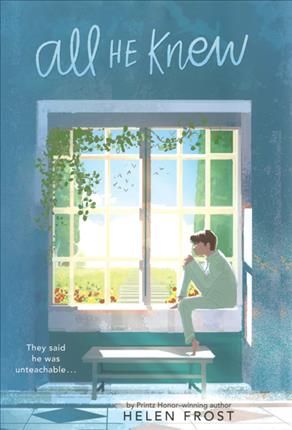| All he knew Author: Frost, Helen | ||
| Price: $6.50 | ||
Summary:
In 1939 six-year-old Henry, who is deaf, is taken from his family and placed in a home for the feeble-minded where, years later, his friends include a conscientious objector serving there during World War II. Includes historical notes.
| Accelerated Reader Information: Interest Level: MG Reading Level: 4.70 Points: 4.0 Quiz: 508353 |
Reviews:
Kirkus Reviews (06/01/20)
School Library Journal (+) (07/01/20)
Booklist (07/01/20)
The Bulletin of the Center for Children's Books (+) (00/09/20)
The Hornbook (00/11/20)
Full Text Reviews:
School Library Journal - 07/01/2020 Gr 4–6— From family history about a young Deaf boy who was institutionalized in 1939, Frost, poet and author of the award-winning Keesha's House, has constructed a moving work of historical fiction written in free verse and sonnets. It bridges two worlds: The deaf community and conscientious objectors who, during World War II, numbered 12,000 men. They refused to be drafted, and were assigned to work in state institutions instead, such as one for the "feebleminded" called Riverview. That's where protagonist Henry Williams winds up, and where the U.S. Army assigns 18-year-old Victor Jorgensen for his alternate service. Henry, curious, observant, and Deaf, doesn't belong at Riverview; no one does, Victor realizes. The bond between the boys helps shield some of them from neglect and abuse, but it can't get them released. Someone who can is Henry's elder sister, a courageous young teenager named Molly. The real sister, whose name was Maxine, wrote seven poems "to give my brother the life he never had." The poems became the seed of Frost's project and eventually its soul. Maxine's original poems are included as well. This evocative title is on a par with Colson Whitehead's The Nickel Boys, a historical novel about a reform school for teenage boys in Florida in the 1960s, also based on a true story. VERDICT This must-have is an instant classic of historical fiction, focusing on a Deaf boy institutionalized during World War II. Written in eloquent free verse and sonnets, it's an excellent poetry-teaching tool as well.—Georgia Christgau, LaGuardia Community Coll., Long Island City, NY - Copyright 2020 Publishers Weekly, Library Journal and/or School Library Journal used with permission.
School Library Journal - 07/01/2020 Gr 4–6— From family history about a young Deaf boy who was institutionalized in 1939, Frost, poet and author of the award-winning Keesha's House, has constructed a moving work of historical fiction written in free verse and sonnets. It bridges two worlds: The deaf community and conscientious objectors who, during World War II, numbered 12,000 men. They refused to be drafted, and were assigned to work in state institutions instead, such as one for the "feebleminded" called Riverview. That's where protagonist Henry Williams winds up, and where the U.S. Army assigns 18-year-old Victor Jorgensen for his alternate service. Henry, curious, observant, and Deaf, doesn't belong at Riverview; no one does, Victor realizes. The bond between the boys helps shield some of them from neglect and abuse, but it can't get them released. Someone who can is Henry's elder sister, a courageous young teenager named Molly. The real sister, whose name was Maxine, wrote seven poems "to give my brother the life he never had." The poems became the seed of Frost's project and eventually its soul. Maxine's original poems are included as well. This evocative title is on a par with Colson Whitehead's The Nickel Boys, a historical novel about a reform school for teenage boys in Florida in the 1960s, also based on a true story. VERDICT This must-have is an instant classic of historical fiction, focusing on a Deaf boy institutionalized during World War II. Written in eloquent free verse and sonnets, it's an excellent poetry-teaching tool as well.—Georgia Christgau, LaGuardia Community Coll., Long Island City, NY - Copyright 2020 Publishers Weekly, Library Journal and/or School Library Journal used with permission.



